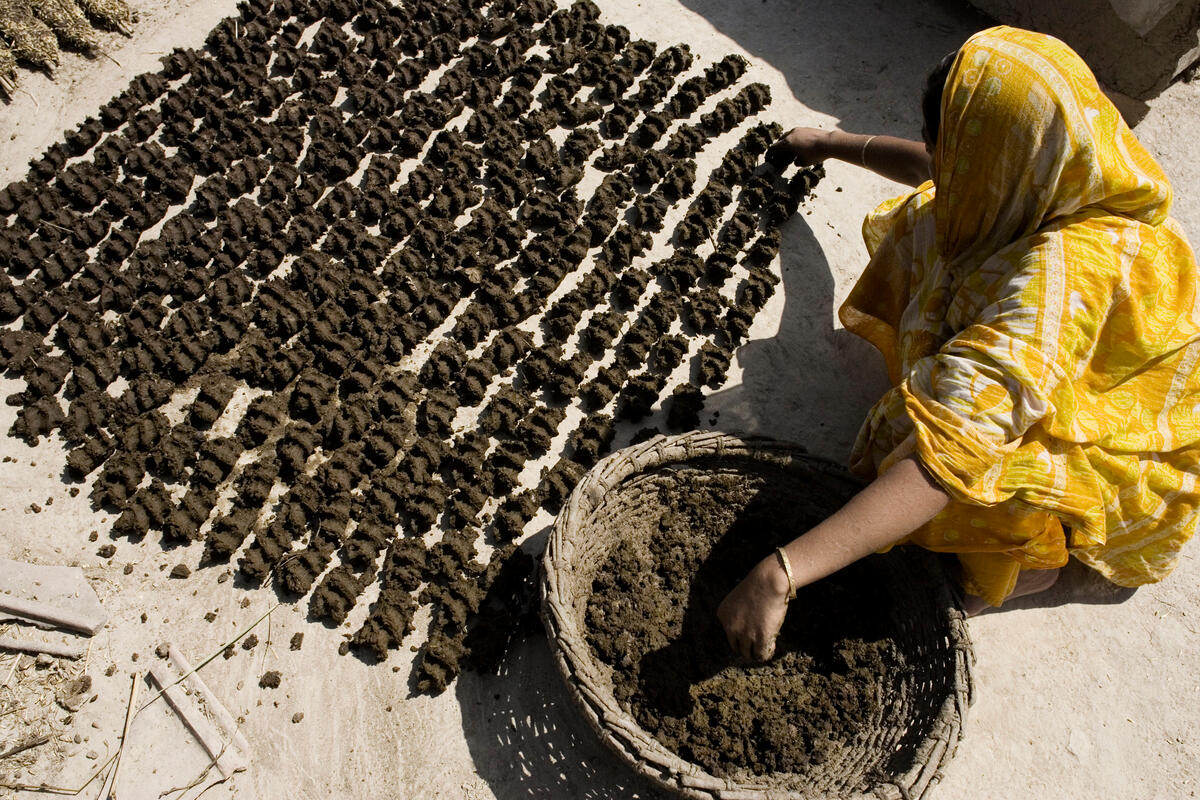Nitrogen use efficiency must be improved to reduce harm to human and environmental health
FAO publishes comprehensive report on Sustainable Nitrogen Management in Agrifood Systems

A villager making biofuel from cow manure. The report says agrifood system policies should encourage the use of organic nitrogen fertilizers to enhance sustainability.
©FAO/Giulio Napolitano
Rome - The rise in nitrogen fertilizers over the past century has significantly contributed to enhancing agricultural production and bolstering food security and nutrition for an expanding global population. Nevertheless, improper use of nitrogen can severely damage air, water, and soil quality, result in biodiversity loss, and exacerbate climate change.
A new report from the Food and Agriculture Organization of the United Nations (FAO), launched today at an event at its headquarters in Rome, provides a comprehensive overview of nitrogen use and the resulting challenges in agrifood systems. It emphasizes the importance of ensuring sustainable use and offers recommendations to achieve this goal.
Nitrogen is an essential component of food constituents, particularly amino acids and proteins required for the growth of plants, animals, and humans.
Thanks to the invention of the Haber–Bosch process in the early 20th century, humans have been able to convert unreactive nitrogen, abundant in the atmosphere (the same nitrogen that makes the sky blue), into useful substances like ammonia, which is now commonly used as fertilizer.
Humans currently add approximately 150 teragrams (Tg) of reactive nitrogen to the Earth’s land surface each year through agriculture and industry. This amount is more than double the pre-industrial rate. Some experts suggest that climate change could contribute to this rate raising to about 600 Tg per year by 2100, which could increase the levels of nitrogen loss into the environment.
Livestock are the main contributors to nitrogen emissions and are responsible for about one-third of the total nitrogen emissions produced by human activity. Synthetic fertilizers, land-use change, and manure emissions are the main causes of nitrogen pollution in this area.
Nitrogen pollution is most severe in North America, Western Europe and certain Asian countries, where fertilizers have been extensively used and misused for decades.
In some low- and middle-income countries restricted access to fertilizers leads to the depletion of nitrogen, which reduces soil nutrients and leads to soil degradation.
A judicious use of nitrogen in agriculture, therefore, helps prevent soil degradation and nutrient depletion while increasing crop yields. In contrast, excessive use exacerbates global warming, degrades air and water quality, and depletes stratospheric ozone. Nitrogen pollution poses risks to human health by increasing the incidence of respiratory and heart diseases.
Therefore, sustainable nitrogen management that focuses on minimizing external inputs and losses and maximizing recycling is more urgent than ever.
"Nitrogen Use Efficiency (NUE) has seen improvements in recent years, which is encouraging. However, significant work remains to be done. This report provides a detailed set of recommendations to further enhance NUE, helping to reduce pollution while promoting environmental and human health," stated Thanawat Tiensin, Assistant Director-General and Director of the Animal Production and Health Division at FAO.
Key actions and policy proposals
The report presents several case studies illustrating ongoing efforts to improve NUE around the world and offers a series of recommendations.
These include:
- The fertilizer industry should take urgent action to reduce greenhouse gas emissions during the production of mineral nitrogen fertilizer and encourage the minimization of wasteful losses during storage, transport, and land application.
- National governments should encourage the widespread use of biological nitrogen fixation (a process in which nitrogen gas from the atmosphere is symbiotically fixed into the tissues of certain plants) in locally appropriate crop rotations using leguminous crops, such as soybean or alfalfa.
- National governments should create guidelines to assist livestock farmers in adopting the best manure management practices, concentrating on minimizing wasteful nitrogen losses to the environment and enhancing its effective use in productive agriculture.
- Agrifood system policies should encourage the use of organic nitrogen fertilizers to enhance sustainability. They should also promote spatial planning by redistributing livestock, reducing the number of livestock in areas with high geographical concentration, and promoting circular bioeconomy approaches.
- National governments should promote the integration of sustainable nitrogen management in nationally appropriate mitigation actions and nationally determined contributions, including targets to reduce nitrous oxide from agrifood systems to keep the Paris Agreement goal of 1.5 °C in sight.
- National governments should set national commitments to reduce nitrogen pollution, including ammonia and nitrates to meet global biodiversity goals.
- National governments should intensify efforts to reduce food waste and loss at all stages of the agrifood system and promote the recycling and treatment of food unsuitable for human consumption as livestock feed.
- National governments, the private sector, international financial institutions, and local agricultural banks should integrate sustainable nitrogen management into development projects and programs in agrifood systems. They should also promote investment in high-efficiency, low-emission mineral fertilizers and the recycling of organic residues to improve system efficiency, minimize resource waste, and reduce environmental pollution.
"Sustainable nitrogen management is crucial for achieving the Sustainable Development Goals by 2030, particularly those related to hunger, health, clean water, sustainable production and consumption, climate action, and preserving life on land and underwater," the report's authors say. "Improving nitrogen use efficiency across the agri-food chain and reducing nitrogen loss can help increase food production in low- and middle-income countries by allowing more nitrogen resources to achieve their intended purpose, improve health by reducing harmful emissions, and protect water bodies from pollution."
Contact
FAO News and Media (+39) 06 570 53625 [email protected]
Nicholas Rigillo FAO News and Media (Rome) [email protected]
